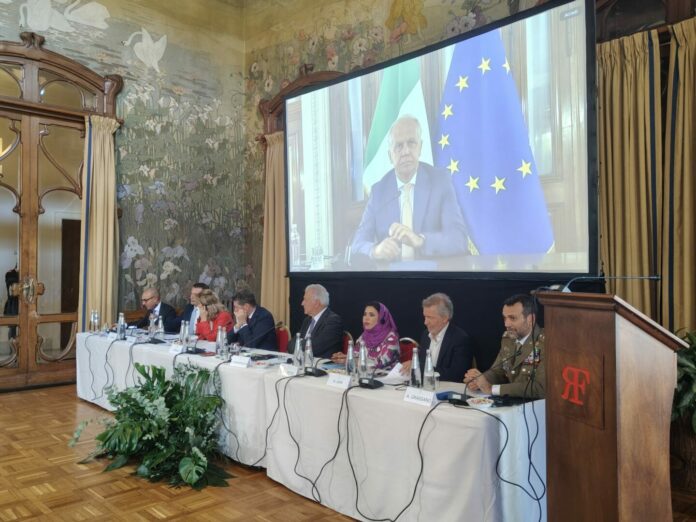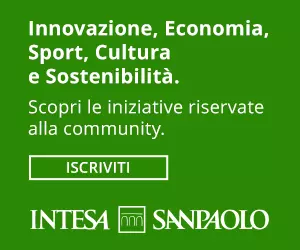PALERMO (ITALPRESS/MNA) – Sicily’s strategic role and the need to strengthen ties between Europe, North Africa, and the Middle East. These were some of the key themes of the international conference “Palermo, Crossroads of the Mediterranean”, held at the Hotel Villa Igiea in the Sicilian capital, organized by the MedOr Italian Foundation.
Numerous national and international guests took turns speaking during the conference, including debate sessions and institutional presentations. The Israeli-Palestinian conflict was inevitably at the center of the discussion, but the challenges of fostering Africa’s development and the active role Europe is preparing to play were also discussed. The Greater Mediterranean is “a large region that, in my vision, extends to the Gulf countries and beyond, all the way to India. A priority region, which we increasingly want to be an area of peace, dialogue, and growth”, Deputy Prime Minister and Foreign Minister Antonio Tajani emphasized in a message. “I am thinking first and foremost of Gaza, where in recent months we have witnessed a veritable carnage. We are opposed to the offensive in Gaza due to the risks to the civilian population, and to any suggestion of forcibly transferring Palestinians from the Strip. Just as we condemn any plan to expand Israeli settlements in the West Bank, or to annex it. We are working for a ceasefire, the release of hostages, and access for humanitarian aid. We cannot and do not want to resign ourselves to further military escalation, which would worsen an already catastrophic humanitarian crisis”. “The Mare Nostrum must no longer be associated with deaths at sea”, Tajani continues. “We work with our Southern Shore partners to combat criminal networks of human traffickers and to promote growth through equal partnerships, also in the spirit of the Mattei Plan. Italy aims to be Europe’s energy hub in the Mediterranean, thanks to a network of connections that has its terminal in our country. This is also why we are leading the IMEC economic and logistics corridor project, the Cotton Route, to which our companies can make a decisive contribution. Because where goods pass, weapons do not. Thanks to our strong commitment and teamwork, we aim to make Italy a leading player in Europe, the Mediterranean, and the world”.
In the afternoon, the meeting was attended, among others, by Interior Minister Matteo Piantedosi, via video, and by University Minister Anna Maria Bernini. “The Mediterranean is not just a sea, but a complex geopolitical system intertwined with global interests, economic dynamics, and migratory phenomena,” emphasized the Interior Minister. “The level of contention among the actors seeking to exert a sphere of influence over it has risen. Thirty percent of the planet’s oil flows beneath the Mediterranean, and a multitude of undersea cables guarantee internet access to thousands of people. Maintaining the viability of the Mediterranean is crucial not only from an economic but also a security perspective: the national interest must look beyond the Mediterranean basin to counter any form of threat”. Every day, Piantedosi continues, “we face the risk that certain individuals may plan to carry out terrorist attacks in our country. Risks also arise from irregular flows, partly due to the shortcomings of countries of origin in exercising efficient border control, something we have strengthened together with a number of international actors. The migrant business generates 5-6 billion euros in profits each year, 1 billion euros of which comes from the Mediterranean alone. Our commitment to combating migrant smuggling and human trafficking continues; we cannot accept criminal cartels enriching themselves by exploiting people’s desperation. The relentless fight against traffickers is not only a moral duty, but a fundamental strategy for containing the flow: migrants must be provided with legal alternatives to their plans before arriving on European soil”.
Bernini emphasizes how Italy is “a hinge between Europe and the broader Mediterranean in terms of research, innovation, and higher education: we already began some time ago with the Mattei Plan to launch a series of concrete actions and collaborations between research institutions. MedOr sits alongside us in the Mattei Plan’s steering committee, but is also a special advisor to my ministry. We develop concrete projects and missions in which we bring together universities, Italian and African research institutions, businesses, and local communities in a highly virtuous ecosystem, to ensure that culture, education, knowledge, and research are interoperable,” he continues. “For research, there are no borders, only connections, and we strive to create them: all this translates into collaboration agreements, called Joint Degrees, and Capacity Building, which involves training managers, officials, and technicians with best practices, so that everyone can speak the same language”.
– photo xd8/Italpress –
(ITALPRESS).















